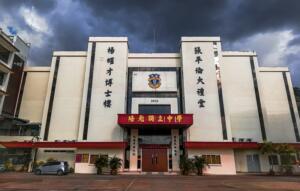Guest Editorial: Vernacular Schools and Igniting Culture Wars

So far, Teo’s writing on the subject of vernacular education has mainly appeared in the Malay media. His research work on the subject is scanty despite his being the recipient of generous research funding grants.
Lim Teck Ghee
Prof. Teo Kok Seong met the police recently to respond to the reports against him for making a statement with the intention to incite. This is providing him the opportunity to refute the charge.
In addition to this claim, he has provoked further racial and political division by asserting in the Merdeka Times video that the existence of Chinese schools is the reason why the Chinese community thinks badly of the Malays.
The question now is: will the authorities continue to turn a blind eye to the prolonged campaign aimed at closing down vernacular schools?
Teo’s comments follow the Federal Court’s decision in support of a ruling by the Court of Appeal which states that vernacular schools are constitutional; and which recognised the use of Chinese and Tamil languages in vernacular schools or national-type schools as legal.
Readers in the non-Malay social media have upbraided his comments. The more charitable have questioned his motive in demonising vernacular education and the Chinese community without providing evidence or scholarship to support his viewpoint. Others have noted that his views echo those of extremist politicians and a few fellow academic opportunists such as Khoo Kay Kim and Riduan Tee. These advocates of assimilation are seen by the non-Malay community as the ones creating disunity by using the vernacular schools and similar ‘national unity’ concerns as the scapegoat for the nation’s racial and religious problems.
Amongst his supporters, a few have argued the case for academic freedom and Teo’s right to voice alternative views. Academic NGO, Pergerakan Tenaga Akademik Malaysia (GERAK), has argued that respect for academic freedom is essential towards developing a society that is cohesive, knowledgeable, mature and intellectual. At the same time, it reiterated its belief that vernacular schools are not to be blamed for disunity. It noted that the vernacular schools offer greater opportunities to foster interracial understanding through dialogue. Both these positions are diametrically opposed to Teo’s. The NGO also noted that the issue had been polarised by Malaysia’s race-based political system, with politicians using it to woo support.
GERAK is fully aware and should have acknowledged that some academics and academic organisations are not exempt from playing the race game. More than a few are equally as adept, if not more, than politicians and for the same opportunistic reasons of self-advancement. Perhaps Teo’s supporters may next be lobbying for a lorong or side street to be named after him after his latest attempt to demonize vernacular schools. He already is recipient of a datukship for his past record.
The timing of this controversy is perfect for Teo and his supporters in the anti-vernacular school movement who are intent on fighting against the most recent court decisions. They now have the golden opportunity to take his case beyond the courts to the academic community as well as to policy makers. Hopefully this will resolve the issue of the existence of SRJK (C) and (T) once and for all. Otherwise, it will continue to be a festering wound in our nation.
Teo’s Research on Vernacular Education and Schools
So far, Teo’s writing on the subject of vernacular education has mainly appeared in the Malay media. His research work on the subject is scanty despite his being the recipient of generous research funding grants.
Teo is undoubtedly a prolific academic commentator. Currently a high-ranking principal research fellow, he lists his expertise in numerous fields, including some that are not only non-academic but would be laughed at or dismissed outright if recorded in any respectable academic institution.
But this is Malaysia and his self-professed specialisations in “ethnolinguistics; linguistic anthropology; peranakan phenomenon; nation building; national unity and integration” have undoubtedly impressed his academic referees and employer; and contributed to his career advancement and current high-ranking position.
In fact, his curriculum vitae in the Universiti Kebangsaan Malaysia website runs to numerous pages (see https://ukmsarjana.ukm.my/main/muatturun_cv/SzAwNDc2OQ==). Dominated by the many columns that appear in his name in Utusan Malaysia, Berita Harian, Dewan Bahasa and the other non-academic outlets meticulously listed for viewers, it is easily accessible for his admirers to gape at. However, it does not appear in his c.v. much evidence to show that he has done extensive or indeed, any, research on the controversial subjects that he has been expounding on and which are regularly published in the Malay media.
Without well designed social science tools and empirical research, it looks like he has relied on hearsay and his own as well the bias and prejudice of his circle of friends and academic associates to arrive at his conclusions on education and race relations. There is also no indication that his academic work, apart from his expertise in Malay literature, on these subjects has appeared in any respectable academic publication or journal. This may be an omission on the part of the recorders that can be easily rectified through fuller disclosure and transparency by Teo himself and his employer.
Interested parties such as the Islamic Education Development Council (Mappim) and Confederation of Malaysian Writers Association (Gapena) which contested the Court of Appeal’s ruling; and Universiti Kebangsaan Malaysia, the National Association of Professors and Institut Kajian Etnik (KITA) can play a key role in Teo’s defence by publicising his work as well as by organising forums and workshops in relation to the subject of vernacular education and national unity.
Besides taking into account the views of the Chinese community – the prime target of Teo’s attack – the position of other stakeholders, especially the more than 100,000 non-Chinese children enrolled in the nearly 2,000 SRJKCs and SRJKT (and the families) must be given weight.
According to critics, these schools have been the step children of the national educational system for too long and that they continue to be discriminated against by the government in funding, land allocation, facilities, etc. Perhaps Teo may want to provide his ‘expert’ analysis on this when running down the SRJKs.
Since independence, several millions of Malaysians, including a considerable number of non-Chinese and non-Indians, have graduated from vernacular schools. There is absolutely no evidence that the schools comprise a disunifying force. Or that they have bred “arrogance” or a sense of racial superiority. Such charges can similarly be easily hurled against their counterpart SJKs and other sectors of education, including the universities of which Teo has been silent about.
Data from Dong Zong has tracked the steady increase of non-Chinese student enrolment from 1989 to 2020. From a small enrolment of 17,309 students or 3.05 per cent of total SJKC students in 1989, non-Chinese students at SJKC have increased to 32,203 or 5.52 per cent (1994), 52,043 or 8.66 per cent (1998), 71,644 or 12 per cent (2011), 80,024 or 13.32 per cent (2012), 87,463 or 15.31 per cent (2014), 94,608 or 18 per cent (2017), and an estimated 101,011 or 19.75 per cent (2020).
Today, the continuing enrolment of many Malay and non-Chinese and non-Indian students in the vernacular schools despite the massive propaganda campaign against them is irrefutable proof of the public confidence in the quality of these schools and their belief that SRJKCs and SRJKTs provide a superior non-racist schooling to their children than is available from the SJKs. Testimonies of the positive role that vernacular schools have played in the lives and careers of many non-Chinese members of our society have appeared in many places. Independent research can back up the praise that these schools have received in being the educational foundation for the success of their students.
The Ministry of Education would do well to support and encourage the development of the SRJKs. In particular the multi-lingual and multi-cultural skills and mind sets provided by these schools are extraordinary and unique. They are critical for the nation’s economy and society in taking on the regional and global economic challenges.
Moving Beyond the Culture War and Perversion of National Unity
Achieving a secure, confident and inclusive nation will never come about when the major and dominant community in the country is consumed by and is obsessed with this form of culture war and its ill-informed and perverted conception of national unity. Such culture wars, including on the celebration of Christmas, Valentine’s day, bakkut teh and now socks, distract all of us from dealing with the far more serious issues of educational reform and the lagging economy. In fact, these wars focusing on language, culture, race and religion ultimately negatively impact the community that they are supposed to protect or uphold.

Lim Teck Ghee, ANU PhD graduate, is a Malaysian economic historian and policy analyst. He has a regular column, Another Take, in The Sun, a Malaysian daily and Oriental Daily; and is the author of Challenging the Status Quo in Malaysia, and Dark Forces Changing Malaysia (with Murray Hunter).

